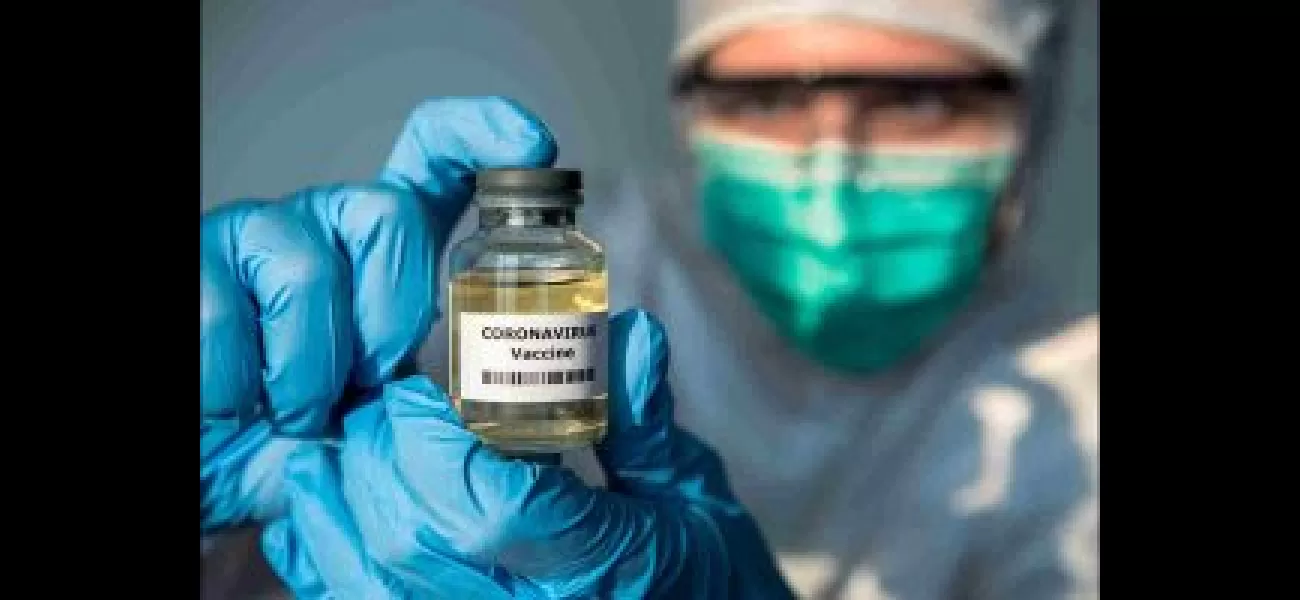Is there a risk of death from Covaxin two years after getting the vaccine?
"Can Covaxin cause death 2 years after vaccination? No, there is no evidence to support this claim. Vaccines are rigorously tested and monitored for safety."
May 18th 2024.

Is it possible for someone to pass away two years after receiving the Covaxin vaccine? This question has been circulating on social media, causing concern and confusion. The answer is no, the Covaxin vaccine does not cause death two years after being administered. In fact, there is no evidence to suggest that there is an increased risk of heart attacks or death two years after receiving the vaccine. Vaccines go through extensive testing and are continuously monitored for safety. Any adverse events that do occur are usually within a short period of time after vaccination, and severe long-term side effects are extremely rare. The World Health Organization (WHO) has thoroughly analyzed the risks and benefits of Covaxin and has approved its use.
Recently, a social media user claimed that the Covaxin vaccine has caused the deaths of millions of people in India. This is a false claim, and we conducted a fact check to confirm this. The individual has shared a post that alleges the vaccine is responsible for the deaths of millions of people in India. Our fact check has proven this to be untrue.
To address the claim, we must first examine the safety of the Covaxin vaccine. As stated earlier, there is no evidence to suggest that the vaccine can cause death even after two years of being administered. Furthermore, vaccines undergo rigorous clinical trials and are thoroughly tested for safety and effectiveness before being approved. This includes continuous monitoring for any potential risks or adverse events. In the case of Covaxin, it was approved for emergency use by the WHO after thorough analysis of its risks and benefits. It is also important to note that vaccines are a crucial tool in combating diseases, and they have saved countless lives and helped control the spread of illnesses.
It is also important to consider that heart attacks and other cardiovascular events can occur due to a variety of factors, such as underlying health conditions, lifestyle, and genetic predispositions. While these events may happen two years after receiving the vaccine, they are unlikely to be directly related to the vaccine itself.
To address the concern about clinical trials, yes, there were extensive trials conducted for the Covaxin vaccine. In June 2020, the Ministry of Health and Family Welfare in India gave permission to start Phase I and II human trials after preclinical studies showed promising results. These trials involved approximately 1,000 participants and showed positive safety and immunogenicity outcomes. They were also published in international peer-reviewed scientific journals. Following these initial phases, the Phase III clinical trials began in mid-November 2020, with 26,000 volunteers across multiple sites in India. This was the largest Phase III efficacy trial ever conducted for any vaccine in India, marking India's first and only Phase III efficacy study for a COVID-19 vaccine. These trials ensure the safety and effectiveness of the vaccine before it is approved and distributed.
Covaxin has received several regulatory approvals to ensure its safety. In India, the Drugs Controller General of India granted conditional market authorization for Covaxin in January 2021. This approval was based on the recommendation of the Central Drugs Standard Control Organization's Subject Expert Committee to upgrade the vaccine's status from restricted emergency use. The CDSCO also approved its sale or distribution for restricted use in emergencies of public concern. The vaccine also received emergency use approval from the WHO in November 2021. However, in April 2022, the WHO suspended its supply through UN procurement agencies due to deficiencies in implementing good manufacturing practices. In response, Bharat Biotech suspended the production of Covaxin for export to address these concerns.
In the United States, Bharat Biotech partnered with Ocugen to collaborate on the clinical development, registration, and commercialization of Covaxin. The US Food and Drug Administration (FDA) lifted a clinical hold on the vaccine in February 2022, allowing Phase II/III clinical trials to proceed. However, in March 2022, the FDA declined to issue an emergency use authorization for Covaxin for pediatric patients aged 2 to 18 years. Ocugen holds commercialization rights for Covaxin in North America and expanded these rights to include Mexico in April 2022. The vaccine has also received emergency use authorization for adults in Mexico and is approved for emergency use in 20 other countries. It is licensed for use in 23 countries worldwide, with the majority of its distribution being in India, where over 77 million doses have been administered as of June 2022.
The WHO's decision to suspend the supply of Covaxin for UN programs is due to the main manufacturing facility in Hyderabad not fully adhering to good manufacturing practices. This occurred because the facility had to focus solely on producing Covaxin due to the COVID-19 emergency. As a result, some equipment needed for strict quality control was unavailable due to the pandemic. Bharat Biotech has emphasized that the quality of Covaxin was never compromised. The WHO has also stated that this does not raise any concerns about the vaccine's safety and effectiveness.
In conclusion, the claim that Covaxin can cause death two years after vaccination is false. The vaccine has undergone extensive testing and is continuously monitored for safety. It has received multiple regulatory approvals and is an essential tool in the fight against COVID-19. The suspension of its supply for UN programs does not raise any concerns about its safety and effectiveness.
There has been a lot of talk on social media lately about the safety of Covaxin, a COVID-19 vaccine developed by Bharat Biotech. One particular claim caught our attention - that this vaccine can cause death even two years after getting vaccinated. This is a serious allegation that raises concerns for many people who have received the vaccine. So, let's take a closer look and see if there is any truth to this claim.
First and foremost, the answer is no. Covaxin cannot cause death two years after vaccination. In fact, there is no solid evidence to suggest that this vaccine increases the risk of heart attacks or death two years after being vaccinated. Vaccines, including Covaxin, go through extensive testing and continuous monitoring for safety. While some adverse events may occur shortly after vaccination, severe long-term side effects are extremely rare. And, it's worth noting that Covaxin was approved by the World Health Organization (WHO) after a thorough risk-benefit analysis.
So, where did this claim come from? It seems that a social media user shared a post stating that Covaxin has caused the deaths of millions of people in India. But, upon fact-checking, we found this claim to be false. It's important to be cautious when reading information on social media and to verify the facts before spreading false information.
Now, let's delve deeper into the safety of Covaxin. As we mentioned, vaccines undergo rigorous testing before being approved for use. This includes Covaxin, which was granted permission for clinical trials in June 2020 after preclinical studies showed promising results. These trials involved over 1,000 participants and were published in international scientific journals. Following these initial phases, the Phase III clinical trials for Covaxin began in November 2020, involving 26,000 volunteers across multiple sites in India. This was the largest Phase III efficacy trial ever conducted for any vaccine in India, adding to the evidence of its safety and efficacy.
Covaxin has also received several regulatory approvals to ensure its safety. In India, the Drugs Controller General granted conditional market authorization in January 2021, following the recommendation of the Subject Expert Committee. The World Health Organization also granted emergency use approval in November 2021. However, in April 2022, the WHO suspended the vaccine's supply through UN procurement agencies due to concerns over the implementation of good manufacturing practices. In response, Bharat Biotech suspended the export of Covaxin to address these concerns.
The vaccine has also received approval for emergency use in 20 other countries and is licensed for use in 23 countries worldwide. However, its distribution is mainly within India, where over 77 million doses have been administered as of June 2022.
So, why did the WHO suspend Covaxin's supply? It turns out that the main manufacturing facility in Hyderabad did not fully comply with good manufacturing practices. This was due to the facility's focus on producing Covaxin during the COVID-19 emergency, which caused some equipment for quality control to be unavailable. Bharat Biotech has assured that this did not compromise the vaccine's quality and that it remains safe and effective.
In conclusion, the claim that Covaxin can cause death two years after vaccination is false. This vaccine has undergone thorough testing and has been approved by regulatory bodies, including the WHO. While some concerns have been raised about the implementation of good manufacturing practices, there is no evidence to suggest that this affects the safety and efficacy of the vaccine. Vaccines are our most crucial tool in fighting against any disease, and Covaxin has played a vital role in controlling the spread of COVID-19 in India. So, let's continue to trust in science and make informed decisions based on facts.
Recently, a social media user claimed that the Covaxin vaccine has caused the deaths of millions of people in India. This is a false claim, and we conducted a fact check to confirm this. The individual has shared a post that alleges the vaccine is responsible for the deaths of millions of people in India. Our fact check has proven this to be untrue.
To address the claim, we must first examine the safety of the Covaxin vaccine. As stated earlier, there is no evidence to suggest that the vaccine can cause death even after two years of being administered. Furthermore, vaccines undergo rigorous clinical trials and are thoroughly tested for safety and effectiveness before being approved. This includes continuous monitoring for any potential risks or adverse events. In the case of Covaxin, it was approved for emergency use by the WHO after thorough analysis of its risks and benefits. It is also important to note that vaccines are a crucial tool in combating diseases, and they have saved countless lives and helped control the spread of illnesses.
It is also important to consider that heart attacks and other cardiovascular events can occur due to a variety of factors, such as underlying health conditions, lifestyle, and genetic predispositions. While these events may happen two years after receiving the vaccine, they are unlikely to be directly related to the vaccine itself.
To address the concern about clinical trials, yes, there were extensive trials conducted for the Covaxin vaccine. In June 2020, the Ministry of Health and Family Welfare in India gave permission to start Phase I and II human trials after preclinical studies showed promising results. These trials involved approximately 1,000 participants and showed positive safety and immunogenicity outcomes. They were also published in international peer-reviewed scientific journals. Following these initial phases, the Phase III clinical trials began in mid-November 2020, with 26,000 volunteers across multiple sites in India. This was the largest Phase III efficacy trial ever conducted for any vaccine in India, marking India's first and only Phase III efficacy study for a COVID-19 vaccine. These trials ensure the safety and effectiveness of the vaccine before it is approved and distributed.
Covaxin has received several regulatory approvals to ensure its safety. In India, the Drugs Controller General of India granted conditional market authorization for Covaxin in January 2021. This approval was based on the recommendation of the Central Drugs Standard Control Organization's Subject Expert Committee to upgrade the vaccine's status from restricted emergency use. The CDSCO also approved its sale or distribution for restricted use in emergencies of public concern. The vaccine also received emergency use approval from the WHO in November 2021. However, in April 2022, the WHO suspended its supply through UN procurement agencies due to deficiencies in implementing good manufacturing practices. In response, Bharat Biotech suspended the production of Covaxin for export to address these concerns.
In the United States, Bharat Biotech partnered with Ocugen to collaborate on the clinical development, registration, and commercialization of Covaxin. The US Food and Drug Administration (FDA) lifted a clinical hold on the vaccine in February 2022, allowing Phase II/III clinical trials to proceed. However, in March 2022, the FDA declined to issue an emergency use authorization for Covaxin for pediatric patients aged 2 to 18 years. Ocugen holds commercialization rights for Covaxin in North America and expanded these rights to include Mexico in April 2022. The vaccine has also received emergency use authorization for adults in Mexico and is approved for emergency use in 20 other countries. It is licensed for use in 23 countries worldwide, with the majority of its distribution being in India, where over 77 million doses have been administered as of June 2022.
The WHO's decision to suspend the supply of Covaxin for UN programs is due to the main manufacturing facility in Hyderabad not fully adhering to good manufacturing practices. This occurred because the facility had to focus solely on producing Covaxin due to the COVID-19 emergency. As a result, some equipment needed for strict quality control was unavailable due to the pandemic. Bharat Biotech has emphasized that the quality of Covaxin was never compromised. The WHO has also stated that this does not raise any concerns about the vaccine's safety and effectiveness.
In conclusion, the claim that Covaxin can cause death two years after vaccination is false. The vaccine has undergone extensive testing and is continuously monitored for safety. It has received multiple regulatory approvals and is an essential tool in the fight against COVID-19. The suspension of its supply for UN programs does not raise any concerns about its safety and effectiveness.
There has been a lot of talk on social media lately about the safety of Covaxin, a COVID-19 vaccine developed by Bharat Biotech. One particular claim caught our attention - that this vaccine can cause death even two years after getting vaccinated. This is a serious allegation that raises concerns for many people who have received the vaccine. So, let's take a closer look and see if there is any truth to this claim.
First and foremost, the answer is no. Covaxin cannot cause death two years after vaccination. In fact, there is no solid evidence to suggest that this vaccine increases the risk of heart attacks or death two years after being vaccinated. Vaccines, including Covaxin, go through extensive testing and continuous monitoring for safety. While some adverse events may occur shortly after vaccination, severe long-term side effects are extremely rare. And, it's worth noting that Covaxin was approved by the World Health Organization (WHO) after a thorough risk-benefit analysis.
So, where did this claim come from? It seems that a social media user shared a post stating that Covaxin has caused the deaths of millions of people in India. But, upon fact-checking, we found this claim to be false. It's important to be cautious when reading information on social media and to verify the facts before spreading false information.
Now, let's delve deeper into the safety of Covaxin. As we mentioned, vaccines undergo rigorous testing before being approved for use. This includes Covaxin, which was granted permission for clinical trials in June 2020 after preclinical studies showed promising results. These trials involved over 1,000 participants and were published in international scientific journals. Following these initial phases, the Phase III clinical trials for Covaxin began in November 2020, involving 26,000 volunteers across multiple sites in India. This was the largest Phase III efficacy trial ever conducted for any vaccine in India, adding to the evidence of its safety and efficacy.
Covaxin has also received several regulatory approvals to ensure its safety. In India, the Drugs Controller General granted conditional market authorization in January 2021, following the recommendation of the Subject Expert Committee. The World Health Organization also granted emergency use approval in November 2021. However, in April 2022, the WHO suspended the vaccine's supply through UN procurement agencies due to concerns over the implementation of good manufacturing practices. In response, Bharat Biotech suspended the export of Covaxin to address these concerns.
The vaccine has also received approval for emergency use in 20 other countries and is licensed for use in 23 countries worldwide. However, its distribution is mainly within India, where over 77 million doses have been administered as of June 2022.
So, why did the WHO suspend Covaxin's supply? It turns out that the main manufacturing facility in Hyderabad did not fully comply with good manufacturing practices. This was due to the facility's focus on producing Covaxin during the COVID-19 emergency, which caused some equipment for quality control to be unavailable. Bharat Biotech has assured that this did not compromise the vaccine's quality and that it remains safe and effective.
In conclusion, the claim that Covaxin can cause death two years after vaccination is false. This vaccine has undergone thorough testing and has been approved by regulatory bodies, including the WHO. While some concerns have been raised about the implementation of good manufacturing practices, there is no evidence to suggest that this affects the safety and efficacy of the vaccine. Vaccines are our most crucial tool in fighting against any disease, and Covaxin has played a vital role in controlling the spread of COVID-19 in India. So, let's continue to trust in science and make informed decisions based on facts.
[This article has been trending online recently and has been generated with AI. Your feed is customized.]
[Generative AI is experimental.]
0
0
Submit Comment





